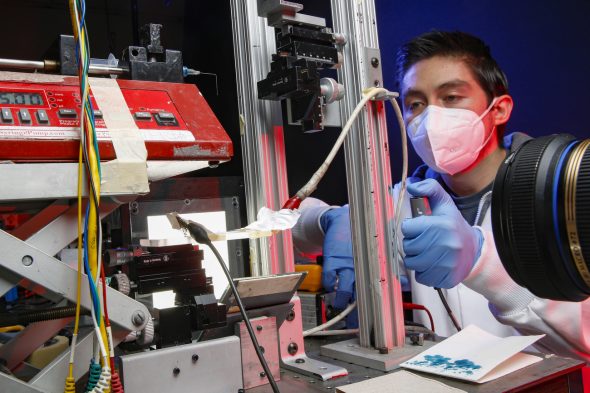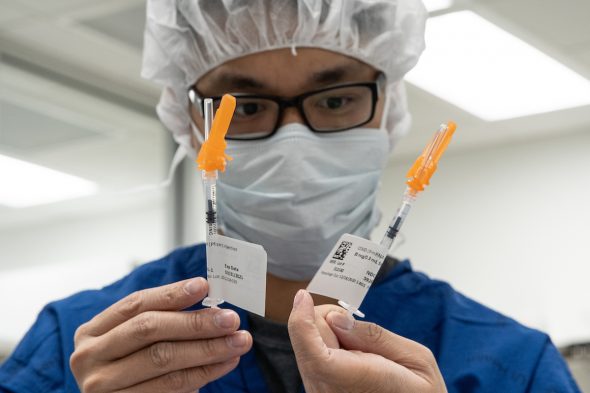UIC reports record $410 million in annual sponsored research awards
The University of Illinois Chicago established a new research record in fiscal year 2020 with sponsored research awards surpassing the $400 million mark for the first time in the university’s history.

The $410 million represents a 7% increase over fiscal year 2019 and 22% increase over fiscal year 2018, and provides support for approximately 9,400 faculty, students and staff working on 1,800 different research projects.
Funding was awarded by a variety of sponsors, including the National Institutes of Health, the National Science Foundation, the U.S. Department of Defense, and many other federal and state funding agencies, as well as foundations and the private sector. The awards supported a wide range of research activities in all UIC’s Colleges and disciplines, from the health sciences and STEM fields, to the social sciences and the arts and humanities.
“The growth of our research portfolio reflects our collective commitment across the university to the creation and application of new knowledge. It further demonstrates our researchers’ dedication and determination to solve some of the world’s greatest challenges and places UIC among the top research universities in the world,” said UIC Chancellor Michael Amiridis.
“This tremendous achievement reflects the hard work and teamwork of our talented laboratory and social scientists, clinician investigators, engineers, data analysts, staff, trainees and others who develop their ideas into discovery,” said Joanna Groden, UIC’s Vice Chancellor for Research. “It also reflects the commitment of our administrative staff to support the needs of our researchers as they translate these ideas into funding for their work.”
Funded projects include a $3.6 million from the National Institutes of Health for the continued support for UIC’s Clinical and Translational Science efforts, a $2.5 million grant from the National Science Foundation to improve undergraduate STEM engagement in environmental sciences, physiology and chemistry using the study of the Monarch butterfly, and a $1.3 million grant from the U.S. Department of Education to mentor Latinx students in successfully earning degrees in STEM fields.
Other highlights include:
- Curating ‘’American Framing,” the U.S. Pavilion Exhibition at the 17th Venice Architecture Biennale ($400,000 award from the U.S. Department of State).
- Developing and providing assistive technologies to people with disabilities ($1.25 million award from the State of Illinois Department of Human Services).
- Assessing the association of chronic eye disease in Hispanic/Latino groups with cardiovascular disease and sociocultural risk factors in an ongoing NIH-funded Hispanic Community Health/Study of Latinos ($2.2 million one-year supplement award from the National Institutes of Health).
- Encouraging more women to pursue computing careers through curriculum, career and community-building activities ($1.1 million award from Pivotal Ventures and Cognizant U.S. Foundation).
- Identifying biomarkers associated with Niemann-Pick Type C, an inherited neurodegenerative disease using state-of-the-art mass spectrometry ($1.3 million from the Together Strong NPC Foundation).
- Studying glucose metabolism in type 1 diabetes patients during phases of the menstrual cycle ($2 million award from the Juvenile Diabetes Research Foundation).
- Constructing a beamline to expand chemistry and materials research capability through a partnership with the Argonne National Laboratory ($14 million from the National Science Foundation).
“Federal funding, which accounts for nearly 75% of UIC’s research volume in FY20, is critically important to our research activity and is the primary source of our funding,” said Groden. The National Institutes of Health (NIH) was the largest UIC research sponsor in FY20, providing over $169 million in funding. This includes support for 155 active R01 grants, indicating the strength and breadth of UIC’s research in the health sciences. The active R01 projects range from studying the plasticity circuits in Alzheimer’s disease to using botanical dietary supplements as alternatives to hormone replacement therapy for women’s health, to improving blood pressure with resistance exercise in African Americans.
UIC faculty have also received a significant number of Faculty Early Career Development Program (CAREER) awards from the National Science Foundation (NSF) — 18 in the 2020 funding cycle — designed to help rising U.S. researchers and scholars establish long-term leadership through the integration of research and education. Their projects span from the development of reactive electrochemical membranes for sustainable water treatment to researching lipid transport in membranes. The success of UIC’s junior faculty in this area is a strong indicator for the continuing growth of the university’s research endeavors.

As expected, in recent months UIC researchers have also focused on COVID-19-related work and were awarded over $32 million in funding in this area ($8.4 million in FY20 and over $24 million so far in FY21). Highlights include:
- Clinical trials for the Moderna and Janssen vaccines and the Regeneron and Eli Lilly monoclonal antibody drugs.
- Piloting a program to use convalescent plasma to treat COVID-19 patients.
- Creating a Hero Registry for participation in the national Healthcare Worker Exposure and Outcomes Registry.
- Testing the efficacy of saliva home tests to measure potential outbreak hotspots.
“Our clinical researchers at UIC have addressed the urgent need for new therapeutic approaches to care for those infected by COVID-19, and to prevent infection with vaccine studies,” said Groden. “UIC researchers of all types continue to generate the tools and the processes needed to address the pandemic’s effects on so many, while others work to understand the disease mechanisms of the pathogen.”
In FY20, UIC also reported 580 patents issued, 289 active licenses of its intellectual property, $50 million in licensing income, and 26 new startups associated with UIC’s research. Currently, UIC has three major therapeutics on the market licensed to major pharmaceutical companies, including Prezista, an anti-HIV drug (Janssen Therapeutics); Tice BCG, a bladder cancer drug (Merck); and Shingrix, the world-leading vaccine for shingles (Glaxo Smith Kline).
